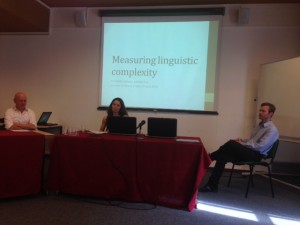Presentation by Phillippe Blache, Laboratoire Parole et Langage, CNRS & Aix-Marseille Université
Part of the Measuring ling. complexity: A multidisciplinary perspective workshop at UCL, Belgium, 24 April 2015
Complexity means different things to different people
System vs Structural complexity (Dahl, 2004)
Existing models: incomplete dependency hypothesis, dependency locality theory, early intermediate constituents principle, activation. However, they all fail to describe language in natural environment.
Challenges: dealing with natural data and dealing with language in its context, esp. spoken language and natural interaction.
Hypothesis: difficulty depends on the search space size. The larger the search space, the more difficulty.
The more properties, the smaller the search space. Maximize online principle (Hawkins, 2004).
Generative grammar is a very restrictive view.
Property grammars: linguistic statements as constraints (filtering + instantiating)
Basics: constraints are independent, linear precedence.
Constraint violation is possible.

